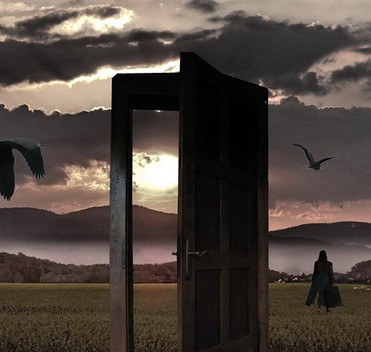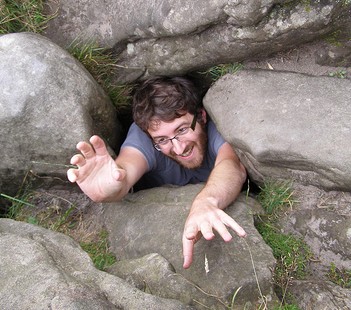A Few Cool Doors That Open When You’re Published
Today’s guest post is by author and screenwriter Harrison Demchick:
It’s a long, long road to publication, as months or years of writing give way to months of editing, and then more editing, and then more editing. But you’ve arrived at that very best version of your story. You’re proud of it, and you should be. And once you launch it on Amazon, or your publisher launches it into the world, there will be nothing between you and superstardom. Right?
Yeah. Not so much.
No Guarantees
Writers who follow the publishing industry already know full well that creative success and commercial success have, at best, a complicated relationship, and even the most carefully considered marketing plans include no guarantees. When my novel, The Listeners, launched in late 2012, I knew from my own seven years in publishing that the top of the New York Times bestseller list was pretty unlikely, and I was going to have to fight like hell even to make anyone aware of my book. After all, a million new books are published every year.
It was a fight. I don’t know if I won. I don’t know if you’ll win. But we didn’t start writing to be rich and famous, did we? (If we did, my God, did we choose the wrong field.) We started writing because we had stories to tell. We started writing because we had dreams of creating something special.
So remember that, and remember this as well: just because you can’t quit your day job just yet doesn’t mean that there aren’t some really cool things that come with publication.
1.) Readers
You don’t need to reach the world to reach a single reader, and sometimes a single reader is all it takes.
One of the best moments early in my publication experience came when I received a YouTube review from a twelve-year-old boy in New Zealand. He loved the book, ranking it only behind Stephen King’s The Stand among his very favorite horror novels. It didn’t matter that this was only one reader, and it certainly didn’t matter that he was a bit younger than the typical reader I’d expected. Someone on the other side of the world—someone I will in all probability never ever meet, and someone with whom I will likely never even share a continent—read my book, and liked it.
The world is a small place. Launching your book out into it is one of the most validating ways to discover that.
2.) Bookstores and Signings
When you imagine book signings, you see a line out the door, every man, woman, and child in it clutching a hardcover copy of your book and waiting for you.
When you see book signings, you usually see a lonely author at a lonely table looking around anxiously for anyone to notice them.
You’re more likely to experience the latter than the former. But while there are certainly some depressing things about book signings—the worst for me was a two-and-a-half-hour drive to West Reading, Pennsylvania, for a signing that drew only three people, one of whom was the bookstore cat (who, like the others, did not buy a copy)—there are some really great parts as well.
For example: your book on a bookshelf in a bookstore. Maybe it’s just for the event. Hopefully it will sell, but maybe it won’t. But you can’t deny the tingle running up and down your body when you see your work in a bookstore for the first time. (Nor can you deny the subsequent happy dance that may or may not have been witnessed by the staff of Barnes & Noble.)
Then there are the events. Some will get you pretty much nowhere, but then there are opportunities like BookExpo America. The summer after The Listeners came out, thanks to the Horror Writers Association, I had a chance to sign and give away one hundred copies to a genuine line of readers in only half an hour. Did it mean I was famous? Would I have moved that many books with a price tag? Of course not. But for just a little while, I was a rock star. It comes down to being open to the opportunities that emerge once your book is in the world.
3.) Speaking Gigs
It doesn’t matter how big your book is or isn’t. When you’re an author, people consider you an expert on something—on writing and publishing, if nothing else. And that’s because the vast majority of people who start a book never finish one. The simple fact of being a published author is an accomplishment in its own right.
And that means you can be on panels at writing events. You can speak with potential authors at writing groups. People care what you have to say—because you do have something to say. And you have the drive to say it.
The very best thing I have had an opportunity to do as an author is speak with the literary arts seniors at my old high school. I attended a magnet school where my focus for four years was writing, and though I graduated more than twelve years ago, it’s still a home for me, and it played a significant role in who I am today. To be able to go back there as someone who continued to pursue writing and became a published author is as special as anything else I could imagine. I’ve done it the last three years, and I love it every time.
So it’s actually not about people caring what you have to say. It’s about you having a chance to say what you care about.
What’s My Point?
It’s far too easy to think of publishing as boom or bust. Win or lose. Succeed or fail. And the fact of most published do fail can make publishing at times a very depressing industry. But reality falls between the extremes, as it tends to, and just because your first book hasn’t set the world aflame, doesn’t mean that publishing isn’t a beautiful experience and your book a remarkable accomplishment.
Not everything will change once you’re published. But some things will. You’ll have opportunities you never had before, if you’re open to them and pursue them. And that makes it all worthwhile.
 Harrison Demchick came up in the world of small press publishing, working along the way on more than fifty published novels and memoirs, several of which have been optioned for film. He is an award-winning, twice-optioned screenwriter, and the author of literary horror novel The Listeners. Connect with him at Ambitious Enterprises.
Harrison Demchick came up in the world of small press publishing, working along the way on more than fifty published novels and memoirs, several of which have been optioned for film. He is an award-winning, twice-optioned screenwriter, and the author of literary horror novel The Listeners. Connect with him at Ambitious Enterprises.
Feature Photo Credit: h.koppdelaney via Compfight cc












Great post, reminding us as creatives to stay grounded & appreciate the little victories.
Little victories go a long way. Thanks for reading!
Such a timely post, Harrison! I can identify with every one of your points and I’d like to add a couple more. Writing my historical novels has taught me much about my own background as a Loyalist descendant because in researching I found my own people’s paths. Pretty cool. The other thing is that writing has given me a voice following my identity as a high school English teacher. Now I’m an author and a prize-winning one at that. Really cool.
Loved your post. Thanks for submitting it to Susanne!
That *is* really cool, Elaine. Once you’ve worked through all the writing and revisions and publication headaches that come with creating a novel, you always have that clear, defined accomplishment–whatever you do after. You will always be an author.
Interesting post which I can well relate to. What’s most annoying is knowing you have a good book, knowing that hundreds who read it love it and about sixty reviews on amazon, newspapers and magazines were all 5 stars, still I can’t get up in the higher rankings of Amazon where this wonderful book can be seen. Yet other books–and I know this having reviewed 114 of them are of lesser quality, yet manage to land in the top 100 categories on Amazon. This is mostly Indie writers who have learned the technical skills to promote and market their own books. And this is where I lack the talent to do that.
Micki, that’s the most frustrating part of the industry–the fact that this is not, in fact, a meritocracy, and great material alone is not what makes a book succeed. I’ve struggled with that as an editor and as an author.
I also lack that innate understanding of marketing. I know intellectually what needs to be done, and I know it well enough that I can offer pretty detailed advice on the subject, but when it comes to *doing* it, the instinct isn’t there.
When The Listeners was published, I compensated for that by hiring book publicists. I don’t know if it moved books–even the professional publicists, much of the time, are operating mainly under the principle of trial and error–but it was definitely the thing to do. That said, when I’m in editor mode, I tend to emphasize that the only part of the equation we really control is the quality of our own work. Even if it never takes off the way you want it to, you’ve still created something special.
Good points! I spent a fortune (yes, a big fortune) on a publicist for the first two books of my fantasy series and it was a complete waste of money. It does take time and effort to learn how to market and to implement it all over years of persistent effort, but it does pay off over time as you build fans. take a look, Micki, at my posts a while back on “1,000 true fans.” I’m a big believer in slowing growing a core group of loyal fans who spread the word about your books. And it takes time to engage those fans and build that “tribe.”
thanks so much for such a valuable and insightful post, both Harrison for your experiences, and C.S. for hosting him.
I’ve been writing free lance for years and have just entered the realm of novel writing. My 1st novel will be published by a small press. I always appreciate the little things: they always mean so much more and your post shows that.
Keep writing: Both of you!
Regards,
S.J. Francis
Congratulations, S.J.! That’s a huge deal. I came up in small press publishing. My novel came out through that route as well. Small presses put out some amazing work, and I wish yours the very best.
You’ve made some great points. Having just self-published my debut novel, my biggest thrill was receiving a 5* review from a male reader for my romantic mystery/adventure. I had hoped to reach a male audience because of the scuba diving and treasure hunt scenes, but wasn’t sure if it would happen. I was also thrilled when a few readers took the time to contact me personally and tell me how much they enjoyed my book. That was more satisfying than seeing the number of books bought on Amazon.
As for the comment that you can get a lot of reviews and still hover near the bottom of Amazon’s pages, I read recently that getting onto bestseller lists in some major publications can be bought. I wouldn’t be surprised if this were true. It’s a big business and a lot is at stake.
Diana, I don’t know if those slots can be *bought* per se, but definitely having resources is useful for getting there. If you’re with a Big Five publisher (which means less and less in terms of quality, but it’s still the criteria most mainstream reviewers respond to), and you can afford a major ad buy in some publication people still read, you have a pretty big advantage. And that will certainly push you up the bestseller lists.
But that’s all the more reason not to dwell on it. It’d be great if every book were on equal footing and the best ones always rose to the top, but for lack of that, it’s great to know that you’ve created something good and that, in your case, that elusive male reader genuinely responded to it.
This certainly gels with my experience. Especially the lonely book signings and tiny royalties aspect. Writing is not the path to riches and glory. However, if you have a story you feel is bursting to get out, what else are you to do? Engage imagination and hit the keyboard.
Exactly, Martyn! Most people who set out to write a novel never finish. You’ve done that. The rewards may not necessarily be financial, but they are most certainly there.
I agree, Martyn. The act of creation is exclusive of all else at that moment. Then after the tough task of revision, I’m able to think about sending my work into the world.
This post really is an eye opener. Thanks, Harrison.
Of course, Sylvia! Thanks for reading!
You did an excellent reflection on your post, Harrison. Each point you mention, including the marketing, is a stepping stone to success. I have been one of the fortunate Indie Writers who have broken through the invisible wall in the past two and a half years.
I have been fortunate enough to make the New York Times, USA TODAY, and Amazon Bestseller’s list multiple times. There are several key strategies that helped me do this.
As you mentioned, Readers. Without readers, there would be no way I could have been as successful as I have been. It is important to develop a strong following and reach out to readers around the world. They are the ones who help me spread the word about my books.
While I have only done two book signings at the two lone conventions I have attended, both have allowed me to develop a relationship with the readers who continue to read, review, and share with others my stories. I enjoy meeting the readers and do everything I can to let them know how much I appreciate their support.
Because of my success, I am now being invited to speak to larger groups about the marketing strategies I have used to be successful. Is it an ongoing endeavor? Yes! I am constantly learning, changing, tweaking, and growing with the publishing field. The biggest thing I believe in is not giving up on your dreams and that it is okay to think ‘outside’ of the box.
Your reflection shows just how important that is. Thank you for sharing your insightful post.
S. E., happy to do it! And congratulations on a remarkably successful run.
Very inspirational, and I think very true for the vast majority of us. As virtually everyone says, it’s the journey — and I think most of them mean it! I doubt I will ever achieve monetary success, but I love seeing my books in print (and ebooks…) and I don’t think I could ever stop the process of writing them. Thanks for your thoughts, Harrison. Cheers.
Harrison, what a timely article. I just published with a small press and am having to do all the marketing for my first book. I have many published friends so I’m watching what they do. It is a lot of work and very frustrating to spend so much time, but I’m having little successes and keep telling myself it all takes time for it to move forward. It’s nice to know this is the norm!! Thanks for sharing!
Sheri s Levy,
Author of Seven Days to Goodbye
Sheri, happy to share–and congratulations on that novel!
Cheers to you as well, Don! And of course, it’s not as if we shouldn’t keep fighting for that success, and aspire to be working writers, because it’s a goal worth fighting for. We just need to remember that we and our books are not failures if we haven’t yet gotten there.
Did Google + replace regular Google?! I tried to repost this on my Google site but it takes me to a page where I can start a new profile. I deleted cookies yesterday to see if that would make my PC run faster. I do remember now deleting all the Google cookies. Is that why I can’t get to my old site? Sorry to bother you guys with this, but I really want to repost this article on Google.
I also have a novel coming out the beginning of the year, but I would like to have a handle on all my sites by then. Just when I think I have it all figured out, something else comes up.
I also have a Twitter site that hasn’t let me follow new people for years. Should I just start a new profile with the title of my book? In my opinion, how many books one sells has a lot to do with how much presence you have on the net. What do you think?
Sherrie, one of the trickiest parts of marketing is the difficulty in determining cause and effect. You get a great review, and you sell a book, but does that mean the review led to the sale? Most of the time, it’s impossible to tell, and internet presence is the same way.
Contemporary readers love being able to interact with authors, and being available to that is important. But that doesn’t mean you’re going to see a clear connection between internet presence and sales. What it does mean is that you want to make sure that whatever opportunities *do* come along to present your work–whether in the form of a blog interview or a school reading or even something out of left field, like a comic book convention–you take advantage of it as best you can.
As for Google versus Google+, I honestly don’t know, but I surely do appreciate the intent to repost this article. Where the Twitter account is concerned, it depends to an extent on the following you already have. If you’ve taken the time to build a following, you probably don’t want to start a new account, but if you’d be starting from scratch anyway, you might as well.
Congratulations on your forthcoming novel!
Great Post! We definitely have to remember that we write because we love it!
I’m not published (yet), but there is a woman in my writing group with over 2 dozen published novels who still has her day job. She publishes with small presses (not self published and not vanity) under two pen names because some are sci-fi/fantasy and others are romance.
I don’t know how much marketing she does for herself, but it seems that she is just starting to make some money from royalties. It takes a large backlist and a strong following to make a living purely from writing fiction.
Still gonna keep writing. The hard part is not resenting the day job. 😛
Sibilant, I’ve been fortunate with the whole day job thing, because as an editor, I get to work with books and writing all the time, helping authors create the very best versions of their stories.
When it comes to my own writing, though, the day job presented the same obstacles it does for anyone else–in fact, to an extent, even more so. When you spend all day working with writing, writing is not what you feel like doing in your free time.
But of course, you have to, and that’s why writing groups like the ones you describe are so great. They’re a way to make the time, no matter what. That’s how your friend made her way to two dozen novels (which is more than many successful novelists ever write!), and that’s how you’ll make your way to publication too.
So sorry to hear of your experience in West Reading! I am an author from just outside of Reading myself, and to be honest, I am impressed that you were about to get someone to host you in that area. I have yet to be granted a book signing anywhere local – even at my own library! All the best to you, still.
T.C., honestly, it was a bit demoralizing at the time, but in retrospect it’s one of those weird things that can only happen when you’re an author. Maybe I’m just a perpetual optimist, but any good journey includes the occasional misadventure.
The bookstore I read at, if you’re wondering, is the Wise Owl Bookstore. Obviously, my experience doesn’t bode wonderfully for you should you get a signing there, but given you *are* genuinely local, I’d consider reaching out.
I’ve done a few signings, including that one, in tandem with other authors. That may be something to try. If you can find other local authors who write in your genre, it may be easier to book a signing. You can make a bigger event of it.
These are all very familiar. You missed one of my favourites, though: royalty cheques.
“Oh!” I will announce to Facebook, “How exciting! My royalty cheque was just deposited!” Those in the know, are aware that said cheque was probably 3 figures, and two of them were behind a decimal point. 🙂 They still celebrate, because they know every sale is exciting. The others are very impressed that they know an author and brag about it to their friends.
I read somewhere that 98% of authors will never sell more than 200 copies of their book. If that’s true, I’m in the top 2% and I will celebrate with joy. 🙂
Someday, perhaps I’ll sell a million copies, get my interview on CBC, and convince hubby to add that lake view writing loft onto the house. In the meantime, meeting readers, encouraging new writers, exchanging emails with my agent, and chatting at conferences with my favourite million selling authors are fantastic perks of making this dream come true.
(5X WordPress tells me to put in a password before it will post this comment- except it is there, copied and identical. What’s the deal with that?)
Thanks, Shawn. Not sure what the password deal is. No one else has mentioned to me. WordPress sometimes has odd glitches. I agree that the best perks are in connecting with readers. I just love getting nice reviews and e-mails stating how much my books have entertained or moved them.
Shawn, that’s exactly the way to see it. And being in the top 2 percent is most certainly cause for celebration.
I poured my soul out writing a heart-wrenching story about, Bonnie Craig, my 18 year old daughter’s murder and the 17 years it took to get justice; Justice For Bonnie. I will be happy if just one of the 21 states currently not Collecting DNA on All Felony Arrests changes their law. I sent the book to all 21 Governors.
However, like you say in the article, I have heard from two people who it has impacted significantly and they now “hug” people when they hear devastating news and don’t know what to say. Another reader told me she was in a horrible car accident, was wheelchair bound, and hadn’t left her home for over a year. After reading Justice For Bonnie she was totally inspired to not let anything keep her down. She, now, is continuing to “live” her life and is out and about! It brought tears to my eyes when she called and emailed me!
We have no idea what change we may inspire in people. Most times we probably will never find out.
Wow, that’s intense and thanks for sharing that. I am sure you are going to have a lot of response like that, and if you guest blog and write articles to tie in with your book (maybe put a forum on your website for people to share their stories), you are going to encourage so many people.
Karen, you wrote a story you needed to write and changed lives in the process. What could be better than that?
Excellent. And all so very true. You have to do the work before and after the book is written and published. And then, hopefully the doors will start to open!
Absolutely, Ruth! And as long as you’ve put everything you had into the book itself–made it the very best version of itself there could be–you have a shot.
I’ve never met a writer who’s in it strictly for the money, although I’m certain a few such fools wander among us. I’ve been writing fictional stories since before I started kindergarten and have few other activities in which I expend my time and energy. It’s also a form of therapy. It’s amazing, though, how many people think writing is incredibly easy; you just sit down, and the words start flowing, right? I just completed my first novel and hope to publish it within the next couple of months. I’m taking the self-publishing route. But, I haven’t given up my technical writing gigs yet.
I often write about that–how many think writing a novel is easy and it doesn’t take serious study. It does. Too many people write a novel only to learn they’ve done it all wrong. I especially encourage first-time novelists to get a professional critique so that they can see their flaws and learn how to fix them. It’s hard to fix a reputation after you’ve published novels and gotten bad reviews.
This is very true. Part of what makes people think writing is easy is that it’s invisible. Readers know only the book–not the months and years of labor that went into creating it. The same applies to editing, and likely to most creative fields. That’s why creative people are so frequently undervalued.
Congratulations, Alejandro, on finishing your first novel! If you need any feedback, editorial or otherwise, let me know.
Thank you, Harrison. It’s been a long journey; one I allowed to be continually interrupted by life’s challenges and absurdities.
Several years ago my parents – especially my father – were disappointed when I told them my career goal was to become a writer. They thought creative or fictional writing was merely a hobby and not “real work.” To some extent, it is a hobby; something people often do in their spare time. But I later discovered the field of technical writing. When I started college, however, I followed my parents’ desire for me to study computer science. I never considered myself a technical type, but I wanted to make them happy. I eventually dropped out of college in 1987 with a vow to return at some point to finish my education. I did – 20 years later – and earned a B.A. in English – Professional Writing. I’m now a freelance technical writer, but my heart still lies in creative writing. My parents are no longer disappointed with me; nor do they think writing is just a casual hobby.
All my years of working in corporate America, however, did not go to waste. They’ve given me some great story ideas; many of my characters are based on real people. (I’ve just changed the names to protect myself.) I think the best writers are those who’ve experienced life outside of the cocoon of their own environment.
Writers still have to struggle for respect. I recollect the 1988 screenwriters’ strike that practically brought the American entertainment industry to its knees, and the comment by one writer who pointed out that film and TV producers are always willing to pay certain actors and actresses millions of dollars, but suddenly become poor when they get to the writers. The 2007-08 writers’ strike wasn’t as long-lasting, but they got their point across.
I agree that the best moment is when someone really unlikely reviews your book. My moment came when I found a review of Intrusion (Book 1 of A Relative Invasion) which is set in South London and using pov of young boy, from an older man in deepest Texas. Amazing – but it makes you feel validated and suddenly connected as a writer to a reader.
Absolutely, Rosalind. In contemporary publishing, your readers can come from nearly anywhere on the planet. And that is seriously cool.
What a great reminder about why we started to write in the first place. We have a story to tell and if just one person reads or listens it makes your heart grow. While I haven’t sold my novel yet, I have sold two memoirs and seeing them in print along with art work created for them was amazing. And I’ve also done readings of both. So much fun and so satisfying.
Love your idea of sharing with students at your old high school. I’ve been out of high school for a very long time but love public speaking – which began in high school. I may give it a try.
Thank you for the great post.
Of course, Jude! And there is genuinely nothing I’ve enjoyed more as an author than talking at my high school. The major project undertaken by the literary arts students in their senior year–and this was not the case when I was there–is to write and self-publish their first manuscripts. It’s such a fantastic introduction to writing on the professional level, after years learning about writing on the creative level, and it’s great for me too because I can speak to all elements of their experience.
Such fun. I wish I could do it more than once a year.